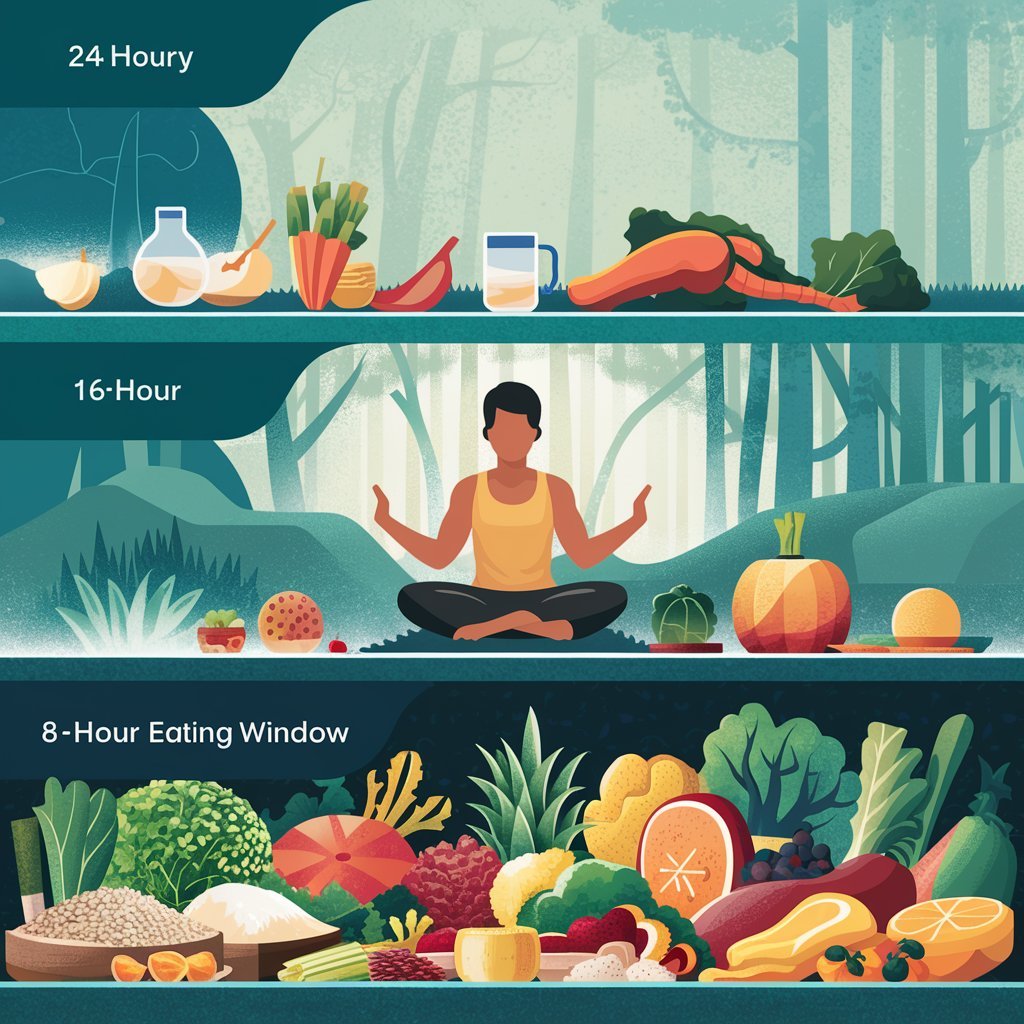What is fasting?
Fasting is the voluntary abstention from food or drink, or both, for a specified period.
What are the health benefits of fasting?
Fasting, a time-honored practice with roots in various cultures and religions, has gained significant attention in recent years for its potential health benefits. From improving gut health to enhancing cognitive function, fasting offers a wide range of advantages that can transform your overall well-being. Let’s explore the science-backed benefits of fasting and how you can incorporate this powerful tool into your lifestyle.
The Science of Fasting
Fasting triggers several metabolic changes in the body, initiating cellular repair processes and hormonal shifts that can lead to numerous health improvements. One of the key mechanisms behind fasting’s benefits is autophagy, a cellular cleaning process that removes damaged proteins and organelles, promoting cellular rejuvenation.

Metabolic Changes During Fasting
- Growth Hormone
- Insulin Sensitivity
- Glucose Tolerance
- Inflammation Reduction
- Oxidative Stress Reduction
Fasting and Gut Health: A Symbiotic Relationship
One of the most significant benefits of fasting is its positive impact on gut health. Fasting can enhance the diversity of your gut microbiome, reduce inflammation in the digestive system, and potentially alleviate symptoms of leaky gut syndrome. By giving your digestive system a break, fasting allows for repair and regeneration of the gut lining.
Mental Clarity and Cognitive Benefits
Fasting isn’t just beneficial for your body; it can also boost your brain function. Many people report improved focus and concentration during fasting periods. Research suggests that fasting may have neuroprotective effects, potentially reducing the risk of neurodegenerative diseases. The gut-brain connection plays a crucial role in these cognitive benefits, as a healthier gut can lead to better mental clarity.
Improved Focus
Fasting increases BDNF production, enhancing focus and concentration.
Enhanced Memory
Reduces brain inflammation and promotes new neuron growth, improving memory.
Increased Neuroplasticity
Promotes growth of new neurons and neural connections, improving adaptability.
Reduced Brain Inflammation
Anti-inflammatory effects may lower risk of neurodegenerative diseases.
Improved Focus
Fasting increases BDNF production, enhancing focus and concentration.
Enhanced Memory
Reduces brain inflammation and promotes new neuron growth, improving memory.
Increased Neuroplasticity
Promotes growth of new neurons and neural connections, improving adaptability.
Reduced Brain Inflammation
Anti-inflammatory effects may lower risk of neurodegenerative diseases.
Fasting as a Tool for Disease Prevention and Management
Emerging research suggests that fasting may have potential benefits for preventing and managing chronic diseases. Studies have shown promising results in areas such as cardiovascular health, diabetes management, and even cancer prevention. While more research is needed, fasting appears to be a powerful tool in promoting overall health and longevity.
For those dealing with specific health concerns, it’s essential to understand how fasting might impact various conditions. Learn more about the relationship between fasting and different diseases to make informed decisions about your health.
What are the different types of fasting?
The main types include intermittent fasting, water fasting, dry fasting, alternate-day fasting, and time-restricted eating. Each type varies in terms of what is allowed and the duration of the fast.
Is fasting safe for everyone?
Fasting is generally safe for most healthy adults, but it may not be suitable for pregnant women, individuals with certain medical conditions, or those with a history of eating disorders.
Implementing Fasting: Tips and Considerations
While fasting offers numerous benefits, it’s crucial to approach it safely and responsibly. The key is to find a method that works for your lifestyle and health goals. A good starting point is time restricted eating. Try not eating for 12-14 hours and only eat in the remaining 10-12 hour window. Once you are comfortable with this eating pattern continue to increase the fasting window by 1 hour until you reach a 16 hour fasting window and an 8 hour eating window.
Key Points for Fasting
- Fasting Window: No food and drink only water, black coffee, tea or herbal drinks
- Start Slowly: Begin with a 12-hour fast, gradually increasing duration
- Stay Hydrated: Drink at least 2 liters of water daily during fasting periods
- Listen to Your Body: Pay attention to hunger, fatigue, or discomfort
- Break Fasts Gently: Eat small, nutrient-dense meals to ease back into eating
- Consult a Healthcare Professional: Seek medical advice before starting a fasting regimen
When implementing a fasting regimen, pay close attention to your nutrition during eating windows. Focus on nutrient-dense foods that support gut health and overall well-being. Incorporating fermented foods can be particularly beneficial for maintaining a healthy gut microbiome.
Conclusion: Embracing Fasting for Holistic Health
Fasting is more than just a trend; it’s a powerful tool for improving your overall health and well-being. From enhancing gut health to boosting cognitive function and potentially preventing chronic diseases, the benefits of fasting are wide-ranging and supported by scientific research.
As you explore the world of fasting, remember to approach it mindfully and with respect for your body’s needs. Always consult with a healthcare professional before starting any new fasting regimen, especially if you have pre-existing health conditions.
By incorporating fasting into your lifestyle alongside a balanced diet and other healthy habits, you can unlock its transformative power and take significant steps towards optimal health. Discover more about natural health approaches and how they can complement your fasting journey for a truly holistic approach to wellness.
